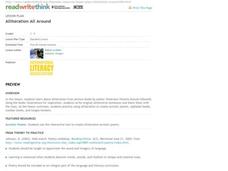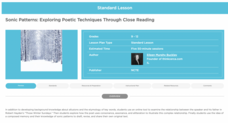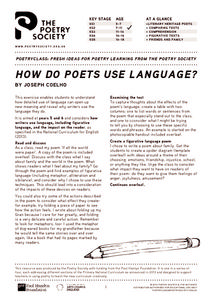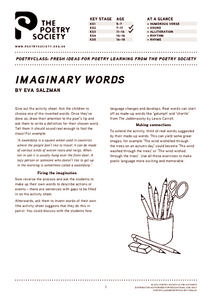Ken Baker
Phonemic Alliteration Lesson Plan
Old MacDonald had a ... dragon? A shared reading of this funny take on the classic children's song engages beginning readers as they learn about phonemes and alliteration.
ReadWriteThink
Alliteration All Around
Discover alliteration found in picture books by Pamela Duncan Edwards. Then, dive into a read aloud of Alligators All Around by Maurice Sendak. This practice sets the stage for budding poets to create their own acrostic poem, write an...
Manchester University
Alliteration
Kids create cool clauses selecting a single starting sound. Ah, alliteration.
Poetry Internation Volume 17, 2011
Alliteration, Consonance, and Assonance in Poetry
Three poems, “Under the Mangoes” by Jacqueline Bishop, Eleanor Wilner’s “What It Hinges On,” and Robert Frost’s “Stopping by Woods on a Snowy Evening,” provide the text for an examination of alliteration, consonance, and assonance. After...
Curated OER
Poetic Elements Are Fun!
Engage your class in the elements of poetry with a series of lessons and activities. The plans cover simile, metaphor, personification, onomatopoeia, alliteration, and imagery. Learners come up their their own metaphors, identify poetic...
Curated OER
Poetic Devices
Introduce middle schoolers to poetic devices with a lesson that asks them to find examples of alliteration, anaphora, onomatopoeia, metaphors, similes, and personification in various poems. Young scholars craft examples of these poetic...
ReadWriteThink
Sonic Patterns: Exploring Poetic Techniques Through Close Reading
Robert Hayden's poem "Those Winter Sundays" serves as the anchor text in a five-part lesson plan that takes the mystery out of poetry analysis by modeling explicit strategies for pupils to employ to conduct a close reading of a poem....
August House
The Great Smelly, Slobbery, Small-Tooth Dog
Read the story The Great Smelly, Slobbery, Small-Tooth Dog: A Folktale from Great Britain by Margaret Read MacDonald and choose from multiple activities to learn about the tale's theme—kindness. With so many options, your kind kids will...
Penguin Books
A Teacher's Guide to the Signet Classic Edition of Beowulf
Beowulf, the Old English epic hero, comes alive again in the activities found in a teacher's guide designed to accompany a reading of the classic poem.
Houghton Mifflin Harcourt
Walt Whitman: From Song of Myself
Looking for a resource that models how to read and analyze a poem? Check out this packet that uses sections of Walt Whitman's "Song of Myself" to demonstrate how to paraphrase, note literary elements, and identify the poet's inferences.
EBSCO Industries
Music and Poetry
Song lyrics, like poems, are meant to be heard. After examining the literary devices in several poems, scholars examine the lyrics of popular songs and identify the sound devices and the figurative language writers use to create the...
Learning for Justice
Maya Angelou
Maya Angelou's poem, "Still I Rise", offers young scholars an opportunity to consider how poets use literary devices to create powerful messages. After a close reading and discussion of the poem, class members reflect on how they can...
K20 LEARN
Say It with Style: Syntax and Parallel Structure
Dr. Martin Luther King, Jr.'s "I Have a Dream" speech provides the text for a lesson plan that introduces scholars to the significance of syntax. After examining several types of clauses, phrases, and structures, class members use the...
Utah Education Network (UEN)
7th Grade Poetry: Ode Poem
Walt Whitman's "Captain, My Captain" and Robert Frost's "The Road Not Taken" provide seventh graders with examples of odes. After reading and discussing these and other examples, young poets craft an ode and respond to the ode of a...
Utah Education Network (UEN)
7th Grade Poetry: Metaphor Poem
The second activity in a five-part poetry unit asks seventh graders to construct a metaphor poem. First, pupils examine Emily Dickinson's "The Railway Train" and identify the metaphor. They then select an object and an animal and craft a...
Utah Education Network (UEN)
7th Grade Poetry: Assess
To assess what scholars have learned throughout a five-lesson poetry unit, seventh graders first craft a Shakespearean sonnet based on a poem they have studied. In part two of the assessment, scholars complete a four-texts performance task.
Curated OER
Revision
Young poets learn the value of using a thesaurus when crafting and revising poems. They examine poems rich in figurative language and then a revised version with the figurative language removed. To demonstrate what they have learned,...
Curated OER
The Poetics of Hip Hop
The Bard, Nikki Giovanni, Mos Def? “Sonnet 18,” Ego Tripping,” and “Black on Both Sides”? Sure! It’s the poetics. Class members compare the lyrics, rhythm, and rhyme in classic poetry to hip-hop in a richly detailed resource that...
Poetry Society
How do Poets Use Language?
Why do writers choose the language they do? Here's a resource that has the poet himself answer that very question. Joseph Coelho explains why he chose the words and images he used in his poem, "If All the World Were Paper."
Poetry Society
Imaginary Words
Oh, what fun! Young logophiles and neologists create a dictionary-sounding definition for imaginary words and try to fool their classmates.
Geography 360°
Poetry Writing
Put the tips and tricks in this guide into practice in order to encourage your pupils to blossom into poets. A wonderful reference material for teachers, this packet includes definitions of poetic terms and forms as well as step-by-step...
Other popular searches
- Poetry Alliteration Examples
- Poetry Alliteration
- Alliteration Activities
- Poems With Alliteration
- Alliteration Lesson Plans
- Alliteration Animals
- Alliteration Poems
- Alliteration in Poetry
- Alliteration and Assonance
- Teaching Alliteration
- Alphabet Alliteration Poems
- Alliteration and Simile






















